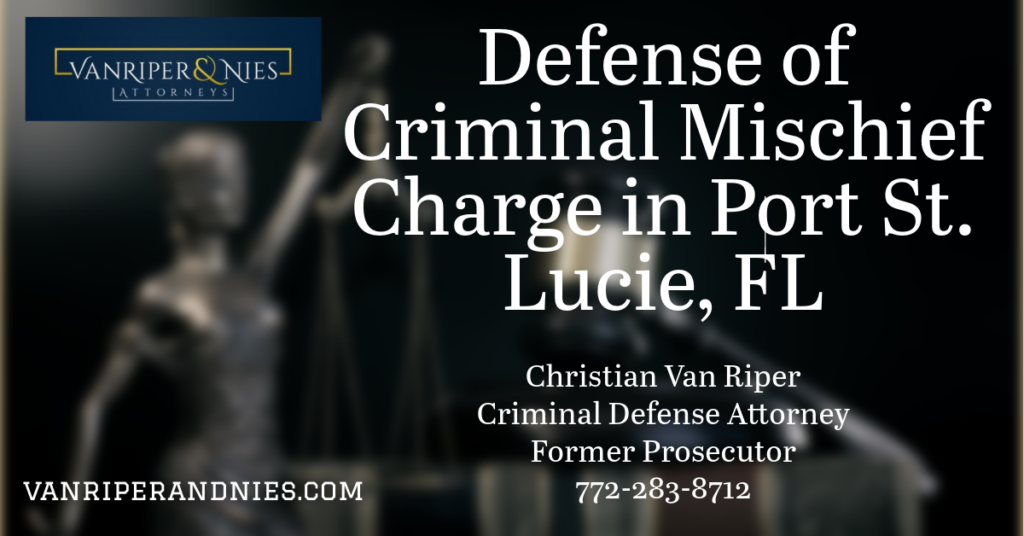
Port St. Lucie Criminal Mischief Defense
Criminal mischief may sound like a minor offense, but in St. Lucie County, Florida, it can have serious consequences. As a Port St. Lucie criminal defense attorney, I often encounter clients charged with criminal mischief who are unaware of how severe these charges can be. In this article, I’ll provide an overview of what constitutes criminal mischief under Florida law, the potential penalties, and the possible defenses available to those facing such charges.
What is Criminal Mischief in Florida?
Under Florida Statute § 806.13, criminal mischief is defined as the willful and malicious destruction of property belonging to another person. This can include vandalism, graffiti, or any other act that damages someone else’s property. The key elements of this crime are intent and the resulting damage. To be charged with criminal mischief in Florida, the prosecution must prove that the defendant intentionally damaged another’s property.
The severity of a criminal mischief charge in Florida depends on the value of the property damage:
- Damage less than $200: This is a second-degree misdemeanor, punishable by up to 60 days in jail and a $500 fine.
- Damage between $200 and $1,000: This is a first-degree misdemeanor, which can result in up to one year in jail and a $1,000 fine.
- Damage exceeding $1,000: This is a third-degree felony, carrying penalties of up to 5 years in prison and a $5,000 fine.
Additionally, if the damage involves certain types of property (such as a place of worship, school, or public utility), or if the defendant has a prior criminal mischief conviction, the penalties can increase significantly.
Common Port St. Lucie Criminal Mischief Defenses
If you’re facing criminal mischief charges in St, Lucie County Florida, several defenses may be available, depending on the specifics of your case:
- Lack of Intent: One of the most common defenses to a criminal mischief charge in Florida is to challenge the intent element of the crime. The prosecution must prove beyond a reasonable doubt that the defendant acted “willfully and maliciously.” If the damage was accidental or resulted from negligence, this could negate the intent required for a criminal mischief conviction.
- Insufficient Evidence: The prosecution must provide clear evidence that links the defendant to the alleged crime. A defense attorney can challenge the sufficiency or reliability of this evidence, such as eyewitness testimony, surveillance footage, or physical evidence.
- Ownership or Right to the Property: If the defendant owns the damaged property or had permission from the owner to make modifications or changes, the defendant cannot be convicted of criminal mischief. This defense focuses on establishing the defendant’s lawful right or ownership of the property in question.
- Mistaken Identity: Criminal mischief cases often rely on circumstantial evidence. If the prosecution cannot provide direct evidence proving the defendant’s involvement, your Port St. Lucie criminal defense lawyer may argue that the wrong person has been accused.
- Constitutional Violations: If law enforcement violated the defendant’s rights during their investigation, such as conducting an illegal search or seizure, the defense attorney can file a motion to suppress any evidence obtained unlawfully. This can lead to a reduction or dismissal of charges.
- De Minimis Defense: This defense is used when the damage caused is so minor that it does not warrant a criminal charge. If the damage is minimal or easily repairable, this argument can be used to seek a reduction of the charges or to negotiate a favorable plea agreement.
Navigating the Legal Process of a Criminal Mischief Charge in St. Lucie County, Florida
When charged with criminal mischief in St. Lucie County, Florida, it’s crucial to engage a skilled St. Lucie County defense attorney who understands the nuances of Florida law. An experienced attorney will:
- Analyze the Evidence: Carefully examine the evidence presented by the prosecution and seek to find inconsistencies or weaknesses in their case.
- Negotiate with Prosecutors: Work with the prosecution to seek a reduction of charges, a favorable plea deal, or alternative sentencing options, such as diversion programs or restitution.
- Prepare for Trial: If a case goes to trial, a skilled St. Lucie criminal defense lawyer will build a robust defense strategy.
Conclusion
A criminal mischief charge can carry serious consequences in Florida, impacting your freedom, finances, and future opportunities. However, several potential criminal mischief charge defenses can be raised, depending on the circumstances of your case. The key to a successful defense is a thorough understanding of Florida law and the evidence against you, which is why having an experienced St. Lucie County, FL criminal defense attorney by your side is essential.

If you are facing a criminal mischief charge in St. Lucie County, don’t take it lightly. Contact our PSL criminal defense attorney, Christian Van Riper of Van Riper and Nies Attorneys, a former St. Lucie prosecutor, to discuss your criminal defense options for free. Call Christian 24/7 at 772-283-8712 for a free consultation.
Port St. Lucie Criminal Defense Lawyer, Christian Van Riper, represents defendants charged with all felonies and misdemeanors in St. Lucie County, including DUI, Theft, Domestic Battery, Theft, Drug Crimes, Violations of Probation, Computer Crimes, Fraud, and all other criminal offfenses.